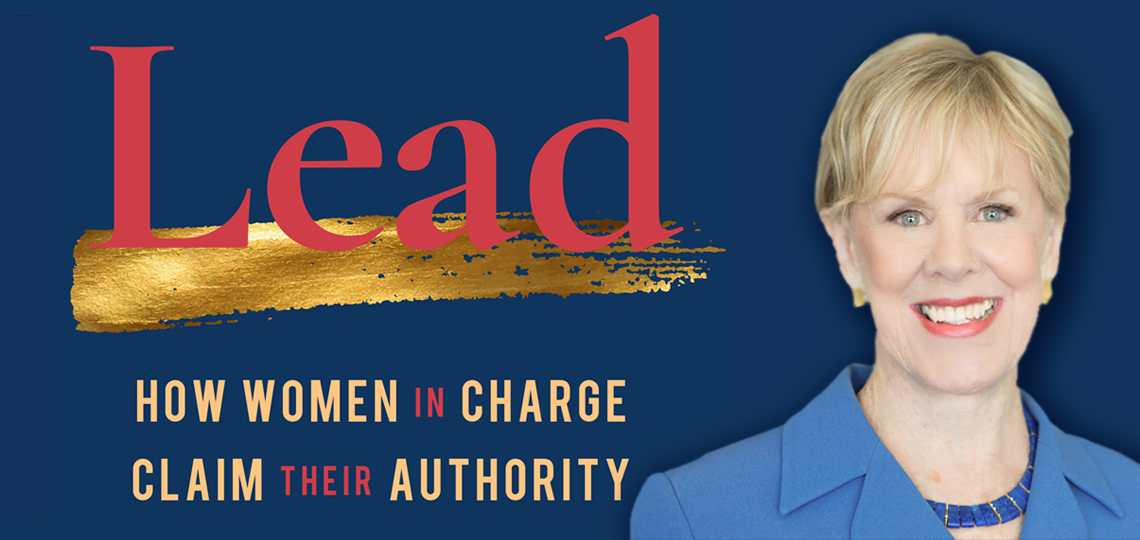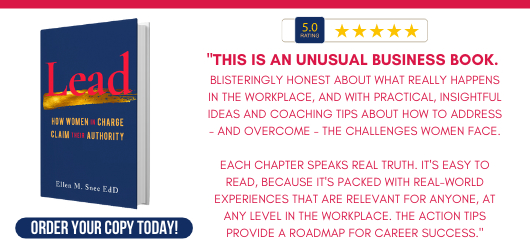Lead like you mean it!

From the earliest days in nurseries and playgrounds as toddlers to the mischief of K–12 on into young adulthood, girls are subjected to a barrage of gender role messages, as well as quite overt resistance from boys and society about leading the pack. It’s an old story, but not the final word.
Today, we’re thrilled to connect with an instrumental guide to helping women rise to the leadership roles they rightfully deserve. A former nun for eighteen years, entrepreneur, and tech executive, Ellen Snee’s Lead: How Women in Charge Claim Their Authority dispenses with the gender comparisons and instead focuses on the unique strengths women bring to relationships. In her work as a coach, she stresses that women must see their interactions with others in multiple dimensions—our relationship with ourselves, with others, and to the systems we live and work in. Only then, she says, can we “understand what is happening and at stake for women.”
Foreword’s Executive Editor Matt Sutherland, himself the son of an acclaimed assertiveness training expert and prominent feminist, jumped at the chance to connect with Ellen for the following conversation.
Many people—mainly men, it seems—view leadership as a competition, a struggle to be the top dog, not based on merit but more as a sign of strength and aggression. Can you help us imagine a more enlightened, equitable leadership dynamic? Does it require that we come up with a new definition of the word “authority?”
I think male leaders see their work world within a strong/weak hierarchy and even see colleagues as potential competition. Some of this is due to how boys are raised—playing competitive sports and being encouraged to be assertive and even aggressive.
Women, on the other hand, bring a more relational and connected approach to their leadership. They are focused on those they work with, for and their own direct reports. Studies during the pandemic showed that women managers spent more time supporting their teams than their male colleagues did. In recent years more emphasis has been placed on listening and engaging others rather than a topdown model of leadership. I have found over the last two decades that women leaders already do that extremely well. Even when they are “in charge” in a role of authority, they are more inclined to engage others, solicit their opinions, and exercise a collective leadership.
I don’t think we need to come up with a different definition of the word “authority” because it refers to when you are the one who is responsible for certain actions, such as hiring, firing, promoting, and allocating resources. There will always be individuals who will hold that responsibility. But what we need to change is how we imagine and exercise this activity.
The female leaders I have worked with tend to foster more participative teams and look for ways that colleagues are complementary. Women tend to promote the development of skills and talents in coworkers with verbal encouragement and praise. Very often men can slip into being more prescriptive in their management and direct and tell people more aggressively what they need to do.
You’re a student of women’s leadership studies from the 1990s showing how women leaders act differently than their male counterparts. But those gender comparisons didn’t interest you much. Instead, you have long sought to understand what works for women in roles of authority. Can you expand on that mission? What are some of the behavioral traits or psychological approaches that differentiate successful women leaders from men?
From the early days of my research on leadership, I found that gender comparisons were a counterproductive approach. As a developmental psychologist I was interested in how girls and women approach leadership and what it is like for them to hold positions of authority. For decades, most of business literature had been written by men about men’s experience. I wanted to bring what I learned about women’s psychological development to the study of leadership. By asking what is it like for women to be in roles of authority, I gained new insights into a different story of human experience. This in turn gave me greater understanding of the challenges women experience intra-personally, inter-personally and within systems.
Rather than saying how successful women leaders are different from men, I would rather suggest three dimensions of women’s experience that need to be recognized, understood, and addressed to be successful. The first is to have a deep connection to your own inner truth. I like to describe that as knowing what your deepest desires are. I think a lot of the current discussion about authenticity is another way of talking about that. To be effective you need to know yourself, your strengths and your challenges, and be willing to be transparent with others about these dimensions of who you are.
Second, is about relationships—most women are very good at relationships but tend to focus on those who need them. They are great caregivers and tend to care for their team, but they often forget to look out at their peers and up at the senior executives and build relationships with those who need to know them. This can have adverse effects when it comes to being promoted. If those who make decisions about promotions, i.e., senior executives, don’t know you, it will be hard for them to recommend a promotion or think of you when a plumb assignment comes along.
Finally, we all live and work within systems. The culture, norms, communication patterns of a company all have enormous impact on anyone’s success. Women need to become more astute about the dynamics of their context—and learn how to make the most of them.
Much of Lead focuses on the strength women have for developing and maintaining relationships in the workplace and why that skill is so important, so beneficial, to leadership. But in a section on promotability, you write that the “relationships that matter [in earning a promotion] are those with your boss, your peers, and upper management,” not with one’s team or staff. Please explain why this distinction matters so much, and why it presents difficulties for some women seeking to advance up the leadership ladder in a company? You also stress the importance of building relationships with women while on the rise in a company. Why is this so crucial?
The section on promotability is a surprising and important finding from the literature on competencies. The researchers made a distinction between what competencies are associated with performance and which ones are associated with promotion—for both men and women. Performance is associated with executing on goals, managing teams well, and delivering results on time and in the proper sequence. It was not surprising that women were found to excel at these skills.
However, being a top performer is necessary but not sufficient for promotion. There are additional competencies needed to be seen as promotable. These include demonstration of effective risk taking, able to learn on the fly, and relationships with senior management. Here is where the focus of the relationships really matters and it is often a space that women don’t pay sufficient attention to. But it requires attention to these relationships in order to be recognized by senior executives for the contributions that you make. You must be known by those in the room when decisions on promotion, etc., are made. Women need to learn how to promote the work they have accomplished even if it at times feels uncomfortable to do so.
Relationships with other women at work have had a long and curious path. When there were few women at the top or on a team, the women were often viewed by others in terms of a contrast thereby setting up a dynamic of competition. It used to be that women were criticized if they were favorable toward other women in hiring or promotions. Systemic dynamics make it hard for women to bond together. However, today as the numbers of women at work are increasing and the opportunities to support each other are enhanced by technology, there is more support for each other. The challenge today is for women to forge strong relationships of respect and support across identity characteristics such as race, class, parental status in order to create a culture where women are genuinely supportive and encouraging of each other.
It’s such a splendid surprise to learn that you were a Catholic nun for eighteen years. Please talk about that experience and how your sisters influenced your views on leadership?
When I began to study leadership and authority in graduate school, I was struck by how much emphasis was placed on listening and communication and engaging others. My experience as a Catholic nun for eighteen years had shown me that women are extremely effective as leaders, no matter what their personality or race or background. I knew that women were great leaders; I had lived and worked with women who ran universities and schools and nonprofits.
As a nun, I also learned that different women hold the power and authority that come with their leadership roles in dramatically different ways. My order of nuns was international, with a leadership team drawn from countries as diverse as Spain, Ireland, India, Uganda, and Argentina. I watched how age, personality, country, and family of origin all contributed to how the women around me held and exercised authority. At the same time, I witnessed how these women overcame differences to live the motto of the order: Cor Unum et Anima Mea—one heart and one spirit. All of this informed my doctoral research, in which I studied the psychological dimensions of holding authority for women, and in particular what it is like to have authority over other women.
Why do you think so many boys and men are resistant to female leaders?
I don’t know. I could hypothesize that they are not accustomed to having someone in a role of leadership be a woman but that is not my area of expertise. I think that the historical dominance of white men in roles of leadership and authority has made accepting women leaders challenging for everyone.
The business world, especially, is keen to develop and advance more women into positions of leadership, which is one of your main missions in life. Please talk about some of the initiatives in place to make this happen? Can you also talk about the political world and what work is being done to bring more women into positions of power in government?
There are many reasons that businesses have embraced a more diverse workforce. For some it is the right thing to do, for others it is the ways to get more talent—since 50 percent or more of the talent pool are often women. But research over the years for organizations like Catalyst have shown that there is a direct correlation between a diverse work force at every level of the organization and business results. Smart organizations have come to see that diversity provides broader and better insights into business challenges and opportunities and will lead to a better bottom line.
Women of color face unique and daunting challenges of racism and sexism in the workplace. This, of course, is a breathtakingly complex topic, but can you talk about how Lead might help women of color succeed professionally?
Yes, women of color face both the challenges of being a woman in the workforce and the discrimination that people of color face. We are only beginning to recognize and appreciate the depth and breadth of these challenges. When I was writing Lead, I reached out to women of color in my network to help me be clear about what I did and didn’t know about the experiences of women of color. I have tried to acknowledge the limitations of my insights while also speaking about what I have come to realize have been my blind spots.
At the same time, I have heard from women of color that the book has been very helpful—that there are lessons and messages contained in Lead that speak to their experience. That has been a great joy for me because my hope had been it could touch all women but I came to see that I could not claim to know the experience of all women. As a result of writing the book at the time of Black Lives Matter and the murder of George Floyd, I have become a fierce advocate of women working together across dimensions of their identities whether that is race, age, ethnicity, parental status, or sexual orientation. We must work together for the sake of each and every one of us.
And can you follow that up with your thoughts on how the book can help women in their positions of authority over other women?
In my research, I discovered that when women are in authority relationships between or “over” one another, there is often an unspoken expectation of how one will treat the other. Sometimes that is the expectation that another woman will be more understanding, or will be more of a friend or … This can result in disappointment when that expectation isn’t met and a feeling that there is something wrong. And if the same thing happened with a man there would not be the surprise or disappointment. So, my advice is that when you are in a relationship of authority with respect to other women, pay close attention to how you communicate and how you establish expectations. And above all you check things out when something goes awry.
As you moved through the academic and corporate world and then while conceptualizing the bones of this book, you write that you created a “relational model built on women’s psychological development—what I call Self-Others-Systems—which recognized that women are always in relationship to themselves, to others, and to the systems in which they live and work.” Why do you believe that this approach is best to nurture effective women leaders?
This approach was rooted in my study of developmental psychology and the psychology of women which emphasized the centrality of relationships in how women develop and grow into wholeness. As I conducted my interviews and later worked with clients, I began to see that there are three simultaneous relationships operating at the same time: our relationship to ourselves, our relationships with others, and our relationship to the systems within which we live and work. All three must be kept in view to understand what is happening and at stake for women.
In my work as a coach, I move back and forth between and among these three relationships. I am always trying to help a client understand her own inner world, her self-dialogues, and what her inner desire and/or call is. I also pay very close attention to the language she uses to describe herself and her experience. I pay particular attention to the use of tentative language (perhaps, I may; would you be able to take my call), self-deprecating language, and her use of the pronouns “I” and “we.” Too often women fail to use “I” to describe what they have accomplished or what they believe. It is important to use both pronouns—not just “we.”
In the book, when I came across the subhead Reclaim Gravitas, I was stopped for a moment because “gravitas” has always seemed to be an innate gift and not something to be taught or reclaimed. In any case, it’s a rare and invaluable quality. How do you view the word as it relates to your work?
I like to think of gravitas as how we come across to others—how we carry or speak with a sense of importance about our work, our vision, our strategy. This is not an innate gift but rather a skill that can be developed. It is also related to inner confidence which is what I am helping clients develop when I talk about your relationship to self. I believe that when we are at work we are very much like an actress on stage—we need to have a full repertoire of personas—and be able to draw on them as needed. Gravitas is one of them.
Gravitas is important for women to either reclaim or develop more fully because it means you are taken seriously, your contributions are considered important, and you are trusted and respected. Gravitas increases your ability to persuade and influence and is likely to fuel the extent to which you rise in an organization. The organization also benefits: you’re more likely to add value if your voice is taken seriously.
I’ve had the privilege of hearing the development goals of hundreds of professionals. They regularly describe wanting to be valued and respected in an authentic way. The first step toward gravitas is the belief that others will know they can trust you. Your experience and expertise are the tools you use to exercise authority, but your belief in yourself is what will allow you to achieve true gravitas.
The best kind of gravitas comes from this authenticity, from the deep interpersonal trust that you build by being clear about the impact you want to make on others, empathizing and finding out about the people you work with, and adhering to your sense of integrity. I’ve seen that you can develop your gravitas while being true to yourself. The key is understanding that your real self can change as you build a deeper set of meaningful, trusted connections with other people.
With men still at the top of a great majority of businesses in the country, the decision to hire women, encourage women, to bring in the necessary consultants/guidance to create a culture favorable to women, still requires a man or men to agree to the necessary changes—and often, those changes require money to be spent, which can make it easier to say no. Can you talk about effective ways to get buy-in from the top, male-centric management, as it relates to women leaders in their companies?
The data overwhelmingly suggests that organizations with greater gender diversity saw profits increase and also found it easier to attract talented employees. Those same companies reported improvements in creativity, innovation, and openness. Other studies have shown a range of other benefits that women in leadership positions bring, including heightened social responsibility and more fulfilling customer experiences.
Data is one of the best ways to get buy-in from top male executives. Studies that demonstrate the effectiveness of greater diversity can be convincing. I have also found that presenting the data on the actual numbers and percentages of women at every level of every organization can have a powerful effect. When they see the gaps in hiring, promotion, and retention, the imperative to take action becomes much more powerful.
My advice to new companies is to include as many qualified women as possible in the early stages because it is challenging to recruit more women later. All organizations should set benchmarks that require more women in the hiring process because that will raise the odds that more finalists will be women. Shine a light on women who are leading in your organization. This provides encouragement and a path for other women to strive toward. And for women already in leadership roles, they need to seek out young, aspiring women professionals and mentor them.
Studies show that in the main, women just aren’t as ambitious as men, which impedes their careers. Is that changing and why?
I don’t know if that is still true. Frequently the lack of ambition is actually a concern about how to balance the multiple responsibilities women tend to have. We have seen during the pandemic that most of the caregiving in families continues to fall on women, even when men are assuming more responsibilities. It’s the cost of ambition—and the struggle women face in pursuing their ambitions—that is what can keep women from pursuing more responsibility. The assumptions about how you have to work to be a top executive need to be challenged if we are going to benefit from more women rising to those positions
I also think that women sometimes don’t take the time to be in touch with their ambition, to name and claim it. And this is what is needed—to articulate your career aspiration—and to do it early and often. I also believe that what women aspire to may be different—they are often driven by a sense of mission or purpose or to make a difference for others. This doesn’t come across as the drive for power, prestige, and financial rewards that we have come to associate with the word “ambition.”
Money management skills, continuing education, networks, professional organizations, and other arrows in the quiver, so to speak, are now recognized as extremely important to positions of leadership. Of course, all of which require huge commitments of time. Does this reality present a unique challenge to women?
I think each of these “arrows” are worth addressing as you begin and grow your career. For instance, a finance course for non-finance leaders can give you the fluency and understanding needed to be more effective in many meetings and decisions. Continuing ed is a benefit to all leaders. Networking and being connected across your organization and outside of your organization are very important but it is how you do it that matters.
Furthermore, it is important to recognize that networking and participating in professional organizations is part of your job as a leader. You can spend “work time” doing that! There is also recent research that shows there is enormous impact in having what I call a squad of other women in addition to the normal networks. Women who have this small group of peers have 2.5 times the likelihood of promotions and increased compensation. These relationships are not “nice to have,” but rather essential for success.
Matt Sutherland



